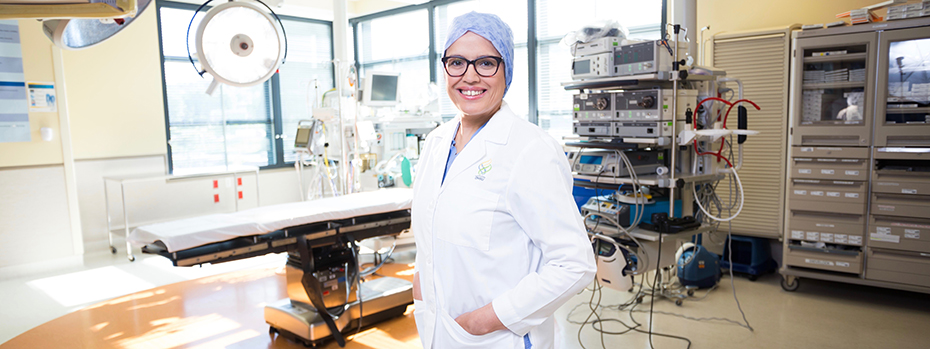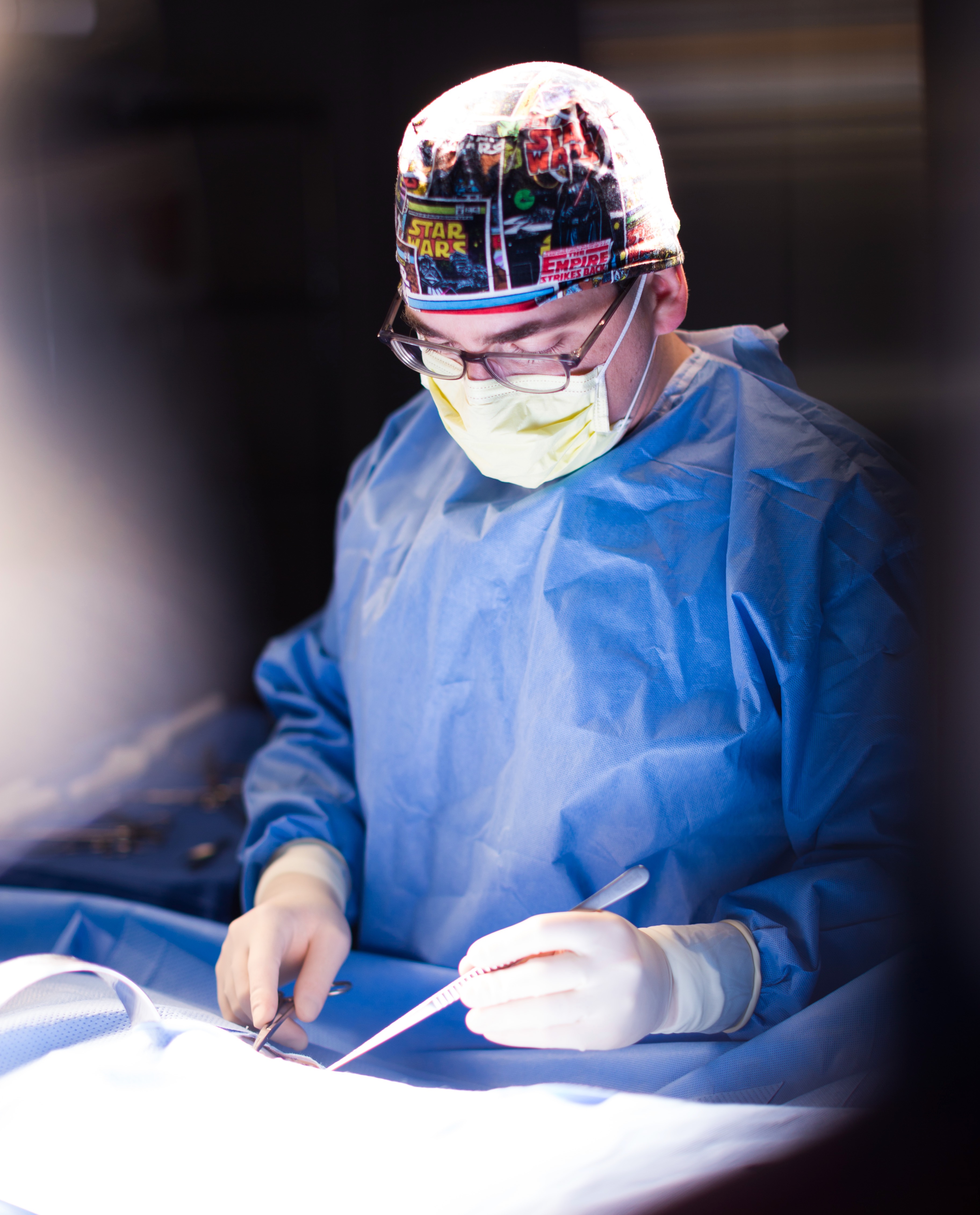Surgery for Cancer

At the OHSU Knight Cancer Institute, our surgeons provide world-class care. We offer:
- Nearly three dozen cancer surgeons who consult with experts across OHSU to give you the best possible care.
- A team with superior skill and training, including advanced study at the nation’s top cancer hospitals.
- The most sophisticated techniques available, including minimally invasive surgery, tissue-preserving techniques and reconstructive surgery.
- Leading-edge technology, such as an iMRI scanner for precise brain tumor removal and one of the largest robotic surgery departments on the West Coast.
- Access to clinical trials of the latest surgical techniques to treat cancer.
- A full range of support services to help you plan for and recover from surgery.
How does surgery help?

Surgery can be used to diagnose cancer, remove or reduce tumors, and ease cancer symptoms. Depending on your needs and how advanced your cancer is, your team may suggest:
- Removing a tissue sample to identify the cancer type or stage.
- Removing the entire tumor, if cancer is contained in one area.
- Removing part of the tumor, if removing all of it might lead to complications.
- Removing tumors that cause pain or pressure, as a way to ease your symptoms.
Your team may consider several kinds of surgery, including techniques that avoid healthy tissue or use smaller incisions than traditional surgery. They will recommend the one that’s best for you.
We also offer exceptionally skilled surgeons for reconstructive surgery, robotic procedures and other specialized techniques.
Why choose us?
Expertise: Our cancer surgeons are fellowship trained in specific types of surgery. They completed advanced study in their specialties at some of the best cancer programs in the country. They include Stanford University, Memorial Sloan Kettering Cancer Center, the Mayo Clinic, MD Anderson Cancer Center, UCSF Medical Center and Harvard University.
National recognition: We’ve earned the National Cancer Institute’s top designation for leadership in research.
Top minds together: Our team includes more than 30 surgeons who are leaders in their fields. They consult one another and surgeons across OHSU. They also work with your other cancer doctors to plan surgery that best serves your overall treatment plan.
Support services: When you seek care from the Knight Cancer Institute you benefit from the full menu of OHSU programs, including specialists in:
- Rehabilitation
- Nutrition
- Survivorship services (life after cancer)
- Cancer social work
Specialized surgical techniques
In the past, most patients had open cancer surgery, in which a surgeon made a large incision to remove a tumor.
Today, we offer many ways to treat tumors and blood cancers, often with small incisions and tissue-sparing methods.
These procedures often result in less pain and faster recovery.
What is it? Minimally invasive surgery uses special tools inserted through small incisions.
- We may use viewing instruments (scopes) with miniature surgical tools. Surgeries include laparoscopy, endoscopy, neuroendoscopy (brain and spine) or thorascopic (chest) surgery.
- In other cases, we might use tools to deliver heat or cooling energy to kill cancer cells, as with laser surgery, cryotherapy, electrotherapy and radiofrequency ablation.
When is it used? Minimally invasive surgery can be used to treat lung cancer, to remove brain and spine tumors, and for some digestive and reproductive cancers. Other examples:
- Our head and neck surgeons may use it remove cancer of the mouth, nose, throat or voice box.
- For cancer at the base of the brain, our skull-base surgeons can use it to remove cancer through the nostrils without an incision.
- Cryotherapy and laser surgery may be used to remove cells that are early signs of skin cancer, lung cancer and reproductive cancers.
What is it? Robotic surgery is an extremely precise type of minimally invasive surgery that uses small incisions and tiny robot-controlled instruments. Your surgeon sits at a console and operates robotic arms that hold surgical tools and a high-powered camera. Benefits include smaller incisions (or sometimes no incisions), fewer complications, less pain after surgery, a shorter hospital stay and faster recovery.
When is it used? Because of its precision, robotic surgery is effective for cancers that may be hard to reach. OHSU has one of the most comprehensive robotics programs on the West Coast. So while many centers offer this only for prostate cancer, we also offer it for cancers of the throat, prostate, bladder, kidneys, uterus and cervix. In addition, we pioneered a technique called transoral robotic surgery, a faster and less painful option for throat cancer patients.
What is it? Mohs surgery is a highly effective tissue-sparing treatment for skin cancer. A Mohs specialist numbs the affected area, then removes the cancer in thin layers. Each layer is inspected under a microscope. The process is repeated until no cancer cells are visible. It offers the best cosmetic result.
When is it used? Mohs is the most effective way to remove skin cancers such as basal cell carcinoma. It has up to a 98 percent success rate, even for skin cancers that have returned. It works well for tumors on the face or ears, where it’s important cosmetically to remove as little tissue as possible.
At OHSU we are national leaders in Mohs surgery. We are the unusual center with the tools and expertise to offer Mohs for some melanomas. Our team is also doing research to improve the procedure so that our patients get the most advanced care possible.
What is it? Reconstructive surgery can rebuild or restore function to parts of the body damaged by cancer. OHSU surgeons use advanced plastic surgery techniques and microsurgery (a delicate procedure performed under a microscope) to give you superior results.
When is it used? Common surgeries include breast reconstruction, facial reconstruction and implants to replace bones or limbs. For instance:
- Treatment for head and neck cancer may affect facial appearance, vision, speech or hearing. Our expert plastic surgeons can do reconstructive surgery to restore these functions, often at the same time a tumor is removed.
- Our breast cancer surgeons offer every type of reconstruction, including surgeries that use a patient’s own tissue. This creates realistic breasts that grow or shrink with a woman as she gains or loses weight, and that age with the rest of her body.
- For patients with sarcoma (cancer in connective tissues such as fat, muscles, nerves and bone), OHSU surgeons are experts at replacing bones or rebuilding limbs. They may use a bone from another part of the body. We also have advanced 3D printers to make custom synthetic bone.
What is it? In vascular surgery, specially trained surgeons use microsurgery to attach or reattach tiny blood vessels to new tissue. They can also rebuild damaged blood vessels.
When is it used? Our vascular surgeons help OHSU patients get the best results from reconstructive surgery after a tumor is removed. Their expertise is especially helpful for patients considering breast reconstruction or facial reconstruction. Our team can also rebuild blood vessels affected by pancreatic cancer. This makes surgery, the only route to a potential cure, possible for more patients than ever.
Learn more
- OHSU Department of Surgery
- Surgery to Treat Cancer, National Cancer Institute
- Special Surgical Techniques, American Cancer Society
For patients
Call 503-494-7999 to:
- Request an appointment
- Seek a second opinion
- Ask questions
Visit our For Cancer Patients page to find a cancer doctor and links to diagnoses.
Refer a patient
- Refer your patient to OHSU.
- Call 503-494-4567 to seek provider-to-provider advice.
Read more
Learn more about OHSU Knight Cancer Institute treatments: